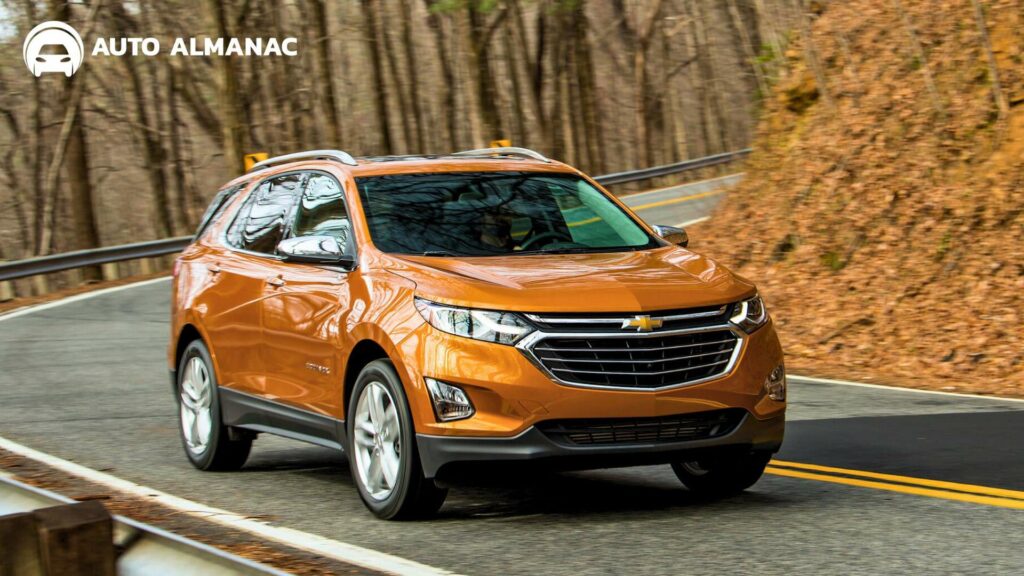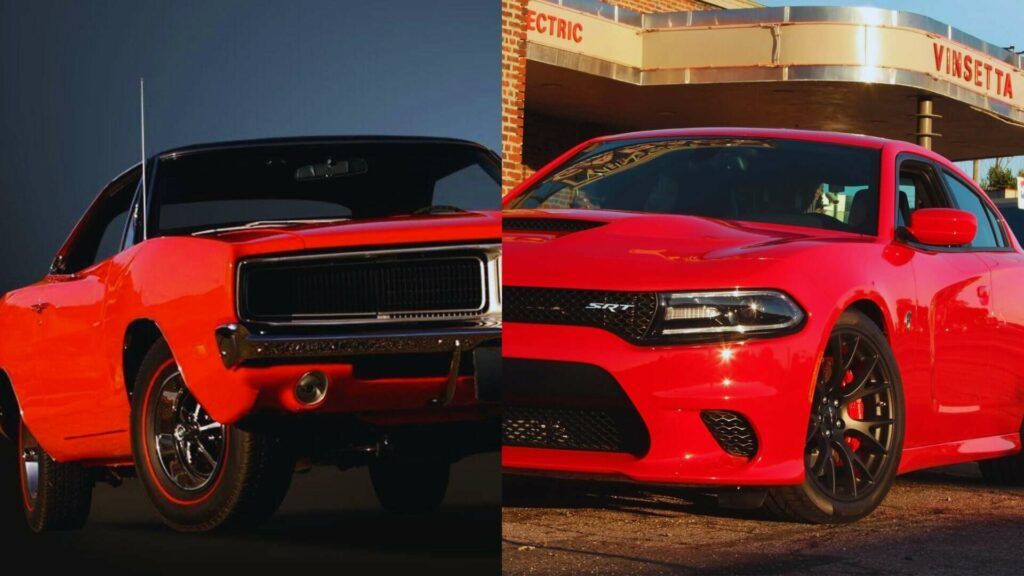
We’ve covered all sorts of vehicles from Chevrolet in our gas-type articles, and now we’re doing the same for the Chevy Equinox crossover SUV!
As with other vehicles on the road, the Chevy Equinox comes with its own set of fuel requirements that ensure that its engine gets fed the right type of gas for optimum performance.
You can also expect other essential info such as the gas tank size and the gas mileage of the Chevy Equinox in this guide, making it even more useful for those looking to buy one.
In addition, we also recommend checking out our dedicated article for the Chevy Equinox’s bolt pattern! Otherwise, let’s start off by first answering the general question below.
What kind of gas does a Chevy Equinox take?
The Chevy Equinox takes regular 87-octane unleaded gasoline for all generations, though premium 93-octane gas is recommended for models equipped with the turbocharged 2.0L I4 for the best performance.
Additionally, all 2nd-gen Chevy Equinox models are capable of taking E-85/Flex-Fuel blends.

Whenever we make guides on which gas to use on which vehicle, we always find it best to start with the octane rating that you should use, as whatever rating is required will apply to any type of gas that is compatible with your vehicle.
In the case of the Chevy Equinox, that octane rating is 87, which is most commonly labeled as “regular” unleaded gasoline.
Based on our extensive research on each Chevy Equinox generation’s owner’s manual, this 87-octane requirement applies to all engine options offered for the crossover SUV.
However, we’ve taken note that the 3rd-gen model’s turbocharged 2-liter “LTG” inline-4 engine, in particular, runs the best when switching to premium 93-octane fuel.
But as we’ve summarized above, 93-octane fuel is only the manufacturer’s recommendation, not a requirement.
Apart from the octane rating, there are still several things to take note of when using different fuel blends (e.g. ethanol blends) and additives for the Chevy Equinox, which we’ll be discussing one by one in the succeeding parts below.
To give a bit of a spoiler, the Chevy Equinox also offers one diesel engine option. But what kind of diesel fuel does it take or need exactly? Read on to find out!
Chevy Equinox Fuel Requirements by Generation and Engine Option
All gasoline variants of the Chevy Equinox require at least 87-octane unleaded gasoline, though 3rd-gen models with the 2.0L I4 engine are recommended to be filled up with 93-octane gas for optimum performance.
3rd-gen diesel Chevy Equinox models require ultra-low sulfur diesel fuel (max 15 ppm).
1st-Generation Chevy Equinox (2005 to 2009)

| Engine Option | Minimum Fuel Requirement |
| 3.4L LNJ V6 | 87-Octane Gasoline (Regular) or Higher |
| 3.6L LY7 V6 | 87-Octane Gasoline (Regular) or Higher |
2005 was the debut year of the 1st-generation Chevy Equinox as a mid-size crossover SUV, and it came in two different V6 powertrains to choose from.
The first of the two engines for the 1st-gen Equinox was a 3.4-liter “LNJ” V6 developed by Shanghai GM, and it’s rated at 185 hp from the factory.
A more powerful 3.6-liter “LY7” V6 came in 2008 that made 264 hp, an almost 80-horsepower jump from the first V6.
Despite the gap in their performance specs, both the 3.4-liter V6 and 3.6-liter V6 actually have the same 87-octane fuel requirement.
2nd-Generation Chevy Equinox (2010 to 2017)

| Engine Option | Minimum Fuel Requirement |
| 2.4L Ecotec LAF/LEA Inline-4 (I4) | 87-Octane Gasoline (Regular) or Higher(E-85/Flex-Fuel Capable) |
| 3.0L High Feature LF1/LFW V6 | 87-Octane Gasoline (Regular) or Higher(E-85/Flex-Fuel Capable) |
| 3.6L High Feature LFX V6 | 87-Octane Gasoline (Regular) or Higher(E-85/Flex-Fuel Capable) |
The 2nd-generation Chevy Equinox was sold between 2010 and 2017 with a revamped engine lineup that also featured an inline-4 engine for the first time.
The 2.4-liter Ecotec I4 served as the base powerplant for the 2nd-gen Equinox, while a 3-liter V6 option offered better performance figures at the expense of drinking a bit more fuel out of the tank.
By 2013, a third engine option was added into the mix in the form of a 3.6-liter V6, but unlike its previous-gen counterpart, this one was labeled as the “High Feature” LFX V6 that was the most powerful engine option on a Chevy Equinox at the time.
It’s also important to mention that all of the engine options of the 2nd-gen Chevy Equinox are equipped with E85/Flex-Fuel systems, meaning that they are capable of taking gasoline with up to 85% ethanol blended in.
This has been the first and last time that any Chevy Equinox model was ever offered as an FFV (Flex-Fuel Vehicle), as we have yet to hear about any Flex-Fuel engine options on the newest 3rd-gen model we’re going to discuss next.
3rd-Generation Chevy Equinox (2018 to 2023/Present)

| Engine Option | Minimum Fuel Requirement |
| 1.5L LYX Inline-4 (I4) Turbo(2018 to 2022) | 87-Octane Gasoline (Regular) or Higher |
| 1.5L LSD Inline-4 (I4) Turbo(2023/Present) | 87-Octane Gasoline (Regular) or Higher |
| 2.0L LTG Inline-4 (I4) Turbo(2018 to 2020) | 87-Octane Gasoline (Regular) or Higher(Premium 93-Octane Recommended) |
| 1.6L LH7 Inline-4 (I4) Turbo Diesel(2018 to 2019) | Ultra-Low Sulfur Diesel (Max 15 ppm) |
The 3rd and latest generation of the Chevy Equinox was unveiled back in 2016, but it wasn’t until two years later that it actually had its first model year.
Once again, the 3rd-gen Chevy Equinox introduced a brand-new set of engine options, and for the first time, a V6 was not included in the lineup.
The 3rd-gen Equinox’s engine lineup consists purely of turbocharged 4-cylinder engines with even a diesel variant being offered for the 2018 to 2019 model years.
While the 1.6-liter I4 turbo diesel option requires ultra-low sulfur diesel fuel (max 15 ppm), the three other gasoline engines listed above all have the same 87-octane gasoline requirements that previous-gen engines had.
However, the top-of-the-line turbocharged 2-liter “LTG” I4 engine fitted in 2018 to 2020 models is recommended to be filled up with premium 93-octane to get the best performance and fuel economy.
Types of Gasoline/Fuel That Can Be Used in a Chevy Equinox
The Chevy Equinox can be filled up with TOP TIER gasoline, reformulated gasoline, E-10 or E-15 blends (non-Flex-Fuel models), and E-85/Flex-Fuel (Flex-Fuel models).
Diesel-powered Chevy Equinox models can be filled up with TOP TIER diesel, ultra-low sulfur diesel (max 15 ppm), or B20 biodiesel.
TOP TIER Detergent Gasoline/Diesel

TOP TIER fuel is one of the most commonly recommended fuels out there for most vehicles, and we have confirmed that this is also true for the Chevy Equinox by reading page 235 of its owner’s manual.
Fuel brands that have adopted the TOP TIER standards make use of a higher concentration of detergent additives in the fuel that they sell.
Such detergent additives have been proven to safely and effectively reduce the buildup of debris or deposits inside your engine, thereby maintaining its performance.
Since the Chevy Equinox is offered in both gasoline and diesel variants, you can make use of either TOP TIER detergent gasoline or diesel fuel depending on your engine of choice.
Both of these TOP TIER fuels can be spotted by looking for their respective labels on the gas pump machine, as shown below. However, TOP TIER diesel fuel may be trickier to find due to the limited number of brands that sell it in North America.

Reformulated Gasoline (RFG)
Just in case you’re unable to get your hands on TOP TIER fuel in your area, reformulated gasoline is also another viable option for the Chevy Equinox and countless other vehicle models.
Reformulated gasoline is an alternative type of fuel that is designed to burn cleaner and reduce the emission of air toxins like nitrogen oxide and carbon monoxide.
Because of its environmental benefits, reformulated gasoline, or RFG, is actually highly recommended and, in some instances, even mandated in areas that have worse air pollution and smog.
Up to 10 or 15% Ethanol Blends (E-10/E-15) (Non-Flex-Fuel Models)

Gasoline that’s blended with the oxygenate “ethanol” can be used for the Chevy Equinox, though there are limitations to how much you can use depending on the model generation.
| By comparing the owner’s manuals of different generations, we’ve found that 1st-gen and 2nd-gen Chevy Equinox models up until the 2011 model year are all limited to just 10% ethanol blends (E-10). Otherwise, 2012 and newer models can take gasoline blended with up to 15% ethanol content, or E-15. |
Since vehicles that are limited to just E-10 or E-15 are not classified as “FFVs” (Flex-Fuel Vehicles), they will come equipped with a regular black gas cap.

E-85/Flex-Fuel (Flex-Fuel Models)

Another type of ethanol blend that you can use for the Chevy Equinox is E-85 or “Flex-Fuel”, but that doesn’t mean every single model has this capability.
| All 2nd-generation Chevy Equinox models equipped with either the 2.4-liter I4, 3-liter V6, or 3.6-liter V6 engine option can take E-85/Flex-Fuel (anywhere between 16 and 85% ethanol-blended gasoline). Otherwise, no other Chevy Equinox generation or model can safely use E-85/Flex-Fuel blends from the factory. |
Since the Chevy Equinox models we’ve listed above can be classified as FFVs (Flex-Fuel Vehicles), they will come equipped with their own unique yellow fuel cap with “E85” printed on it.

Ultra-Low Sulfur Diesel (Max 15 ppm) or B20 Biodiesel (Diesel Models)

Throughout the Chevy Equinox’s entire production run since 2004, the manufacturer has only given it one engine option that can take diesel.
| The 3rd and latest-gen Chevy Equinox’s turbocharged 1.6-liter I4 diesel engine specifically requires ultra-low sulfur diesel (ULSD) containing no more than 15 ppm of sulfur content. Biodiesel blends of up to 20% content (B20) can also be used as an alternative for the diesel-powered Chevy Equinox. |
Types of Gasoline/Fuel to Avoid for the Chevy Equinox
Avoid filling up the Chevy Equinox with gasoline containing MMT, leaded gasoline, and any type of fuel containing methanol, methylal, ferrocene, and aniline.
Gasoline Containing MMT (Methylcyclopentadienyl Manganese Tricarbonyl)

Chevrolet and the majority of today’s automakers do not recommend the use of gasoline containing MMT in any of their vehicles, so it’s unsurprising that this also applies to the Chevy Equinox.
It is stated in every Chevy Equinox generation’s owner’s manual that MMT should not be added to the gasoline that you use for the crossover SUV.
MMT has long been used as an additive to boost the octane rating of gasoline, but it’s also quite known to damage spark plugs and other important fuel system components.
Furthermore, MMT is highly toxic when emitted from your vehicle’s exhaust, resulting in both environmental and health concerns that eventually led to it being prohibited in most of the gasoline sold today.
Leaded Gasoline

While most of the world’s gasoline is already completely free of lead, hence “unleaded gasoline” being everywhere, even the owner’s manual (p.337) of older-gen Chevy Equinox models doesn’t fail to remind us not to use leaded fuel.
Leaded gasoline was initially banned in the US several decades ago for its damaging effects on vehicles’ catalytic converters, but it has also been known to cause lead poisoning, resulting in all sorts of health risks.
Save for some aviation, marine, and motorsports applications, leaded gasoline is not used anymore in just about any kind of land transportation there is.
Fuel Containing Methanol, Methylal, Ferrocene, and Aniline

Other types of fuel that you should avoid for the Chevy Equinox are those containing materials like methanol, methylal, ferrocene, and aniline.
The manufacturer states that the use of fuel that contains any of the materials mentioned above can corrode and damage various metal and plastic components of the Chevy Equinox’s fuel system.
What will happen if I use the wrong gas type?
Using the wrong type of gas, such as gas with a lower octane rating than what your vehicle needs, can result in an audible engine knocking sound, reduced engine performance, and possible damage to the engine internals.
What if I hear a knocking noise from the engine after refueling?
A knocking noise from the engine after refueling can mean that you’ve either put in the wrong type of fuel or the fuel has been contaminated.
Other causes of engine knock can include incorrect air-fuel ratio or improper ignition timing. Thus, be sure to have it properly diagnosed by a mechanic.
Chevy Equinox Gas Mileage Per Generation
The Chevy Equinox has a combined gas mileage of 18 to 20 mpg (1st gen), 14 to 26 mpg (2nd gen), and 24 to 32 mpg (3rd gen) depending on the engine option and drivetrain.
Older Chevy Equinox models get average to decent gas mileage, but 3rd-gen diesel variants give you the best at 32 mpg (combined).
1st-Generation Chevy Equinox (2005 to 2009)
| Engine Option | MPG (City) | MPG (Highway) | MPG (Combined) |
| 3.4L LNJ V6 (FWD) | 17 mpg | 22 to 24 mpg | 19 to 20 mpg |
| 3.4L LNJ V6 (AWD) | 16 to 17 mpg | 21 to 24 mpg | 18 to 20 mpg |
| 3.6L LY7 V6 (FWD) | 16 to 17 mpg | 24 mpg | 19 mpg |
| 3.6L LY7 V6 (AWD) | 16 mpg | 24 mpg | 19 mpg |
2nd-Generation Chevy Equinox (2010 to 2017)
| Engine Option | MPG (City) | MPG (Highway) | MPG (Combined) |
| 2.4L Ecotec I4 (FWD) | 21 to 22 mpg | 31 to 32 mpg | 25 to 26 mpg |
| 2.4L Ecotec I4 (AWD) | 20 mpg | 28 to 29 mpg | 23 mpg |
| 2.4L Ecotec I4(E-85/Flex-Fuel) | 14 to 15 mpg | 20 to 21 mpg | 17 mpg |
| 3.0L High Feature V6 (FWD) | 16 to 17 mpg | 23 to 25 mpg | 19 to 20 mpg |
| 3.0L High Feature V6 (AWD) | 16 to 17 mpg | 23 to 24 mpg | 19 to 20 mpg |
| 3.0L High Feature V6(E-85/Flex-Fuel) | 12 mpg | 17 to 18 mpg | 14 mpg |
| 3.6L High Feature V6 (FWD) | 17 mpg | 24 mpg | 19 to 20 mpg |
| 3.6L High Feature V6 (AWD) | 16 mpg | 23 mpg | 18 to 19 mpg |
| 3.6L High Feature V6(E-85/Flex-Fuel) | 12 to 13 mpg | 17 to 22 mpg | 14 to 16 mpg |
3rd-Generation Chevy Equinox (2018 to 2023/Present)
| Engine Option | MPG (City) | MPG (Highway) | MPG (Combined) |
| 1.5L LYX/LSD I4 Turbo (FWD) | 26 mpg | 31 to 32 mpg | 28 mpg |
| 1.5L LYX/LSD I4 Turbo (AWD) | 24 to 25 mpg | 30 mpg | 26 to 27 mpg |
| 2.0L LTG I4 Turbo (FWD) | 22 mpg | 29 mpg | 25 mpg |
| 2.0L LTG I4 Turbo (AWD) | 22 mpg | 28 mpg | 24 mpg |
| 1.6L LH7 I4 Turbo Diesel (FWD) | 28 mpg | 39 mpg | 32 mpg |
| 1.6L LH7 I4 Turbo Diesel (AWD) | 28 mpg | 38 mpg | 32 mpg |
Chevy Equinox Gas Tank Size/Capacity Per Generation
The Chevy Equinox has a gas tank size of 16 to 20 gallons (1st gen), 18.8 to 20.9 gallons (2nd gen), and 14.9 to 15.6 gallons (3rd gen) depending on the engine and trim level.
| Chevy EquinoxGeneration/Model Years | Engine/Trim Level | Gas Tank Size/Capacity(US Gallon/Liter) |
1st Generation(2005 to 2009) | 3.4L V6 (LS)(2005 to 2006) | 17 gal (64.4 l) |
| 3.4L V6 (LT)(2005 to 2006) | 17 gal (64.4 l) | |
| 3.4L V6 (LS FWD)(2007 to 2009) | 20 gal (75.7 l) | |
| 3.4L V6 (LS AWD)(2007 to 2009) | 16 gal (60.6 l) | |
| 3.4L V6 (LT FWD)(2007 to 2009) | 20 gal (75.7 l) | |
| 3.4L V6 (LT AWD)(2007 to 2009) | 16 gal (60.6 l) | |
| 3.4L V6 (LTZ FWD)(2008 to 2009) | 20 gal (75.7 l) | |
| 3.4L V6 (LTZ AWD)(2008 to 2009) | 16 gal (60.6 l) | |
| 3.6L V6 (Sport FWD)(2008 to 2009) | 20 gal (75.7 l) | |
| 3.6L V6 (Sport AWD)(2008 to 2009) | 16 gal (60.6 l) | |
2nd Generation(2010 to 2017) | 2.4L I4 (LS) | 18.8 gal (71.2 l) |
| 2.4L I4 (LT w/1LT or 2LT) | 18.8 gal (71.2 l) | |
| 2.4L I4 (LT1) | 18.8 gal (71.2 l) | |
| 2.4L I4 (LT2) | 18.8 gal (71.2 l) | |
| 2.4L I4 (LTZ) | 18.8 gal (71.2 l) | |
| 2.4L I4 (LT Fleet) | 18.8 gal (71.2 l) | |
| 2.4L I4 (Premier) | 18.8 gal (71.2 l) | |
| 3.0L V6 (LT) | 20.9 gal (79.2 l) | |
| 3.0L V6 (LTZ) | 20.9 gal (79.2 l) | |
| 3.6L V6 (LT) | 20.9 gal (79.2 l) | |
| 3.6L V6 (LTZ) | 20.9 gal (79.2 l) | |
3rd Generation(2018 to 2023/Present) | 1.5L I4 Turbo (L) | 14.9 gal (56.4 l) |
| 1.5L I4 Turbo (LS FWD) | 14.9 gal (56.4 l) | |
| 1.5L I4 Turbo (LS AWD) | 15.6 gal (59.1 l) | |
| 1.5L I4 Turbo (LT FWD) | 14.9 gal (56.4 l) | |
| 1.5L I4 Turbo (LT AWD) | 15.6 gal (59.1 l) | |
| 1.5L I4 Turbo (Premier FWD) | 14.9 gal (56.4 l) | |
| 1.5L I4 Turbo (Premier AWD) | 15.6 gal (59.1 l) | |
| 1.5L I4 Turbo (LT Fleet FWD) | 14.9 gal (56.4 l) | |
| 1.5L I4 Turbo (LT Fleet AWD) | 15.6 gal (59.1 l) | |
| 1.5L I4 Turbo (LS Fleet FWD) | 14.9 gal (56.4 l) | |
| 1.5L I4 Turbo (LS Fleet AWD) | 15.6 gal (59.1 l) | |
| 1.5L I4 Turbo (RS FWD) | 14.9 gal (56.4 l) | |
| 1.5L I4 Turbo (RS AWD) | 15.6 gal (59.1 l) | |
| 2.0L I4 Turbo (LT FWD) | 14.9 gal (56.4 l) | |
| 2.0L I4 Turbo (LT AWD) | 15.6 gal (59.1 l) | |
| 2.0L I4 Turbo (Premier FWD) | 14.9 gal (56.4 l) | |
| 2.0L I4 Turbo (Premier AWD) | 15.6 gal (59.1 l) | |
| 1.6L I4 Turbo Diesel(LT FWD) | 14.9 gal (56.4 l) | |
| 1.6L I4 Turbo Diesel(LT AWD) | 15.6 gal (59.1 l) | |
| 1.6L I4 Turbo Diesel(Premier FWD) | 14.9 gal (56.4 l) | |
| 1.6L I4 Turbo Diesel(Premier AWD) | 15.6 gal (59.1 l) |




